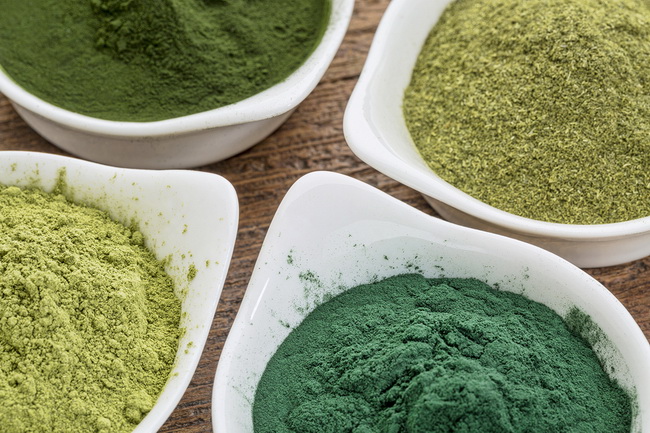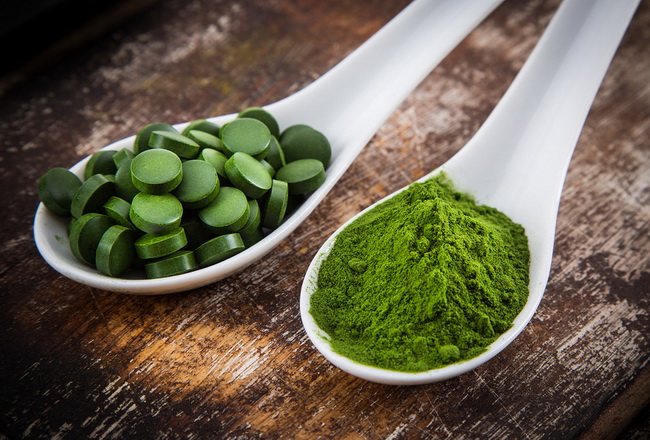- Make It Yourself Lavender Heart-Shaped Bath Bombs!
- 20 Things You Never Knew About “Down There”
- 12 Best Foods For Those Suffering From Arthritis Pain
- 12 Personal Hygiene Mistakes Almost Everyone Makes (Mom Never Told You About #4!)
- 15 Medicinal Plants And Herbs From The Cherokee People
- 12 Mind-Blowing Benefits Of Drinking Coconut Water During Pregnancy
- 12 Outstanding Winter Foods That Won’t Fatten You Up Like A Christmas Turkey
12 Unbelievable Reasons to Consume Spirulina (#4 is Awesome!)

Photo credit: bigstock.com
You might have heard about spirulina but thought that this was something that only health nuts got into. Maybe you though spirulina was a new rock band. Then again, maybe you’ve never heard of spirulina.
In case you haven’t heard, spirulina is a type of blue-green algae. This is an incredible super food that provides humans with a super concentrated source of antioxidants, vitamins, and nutrients. Spirulina is perhaps one of the oldest forms of life on this planet and was used for food as far back as the 9th century in Chad and was consumed by the Aztecs in 16th century Mexico.
Why should you consume spirulina? We have 12 almost unbelievable reasons and after you read them, you will understand what all the fuss is about.
1. Highly Digestible
The protein in spirulina is 90 percent digestible, since it does not have cellulose walls such as chlorella or yeast. This means that the net protein utilization of spirulina is a ridiculously high 61 percent and it requires no cooking to increase this bioavailability. Confused? This simply means that your body will be able to use almost all of the protein in spirulina, which isn’t true of any other protein.
2. Extremely High In Nutrients
Spirulina grows in both fresh and salt water and is often called blue-green algae. Like plants, spirulina produces energy from sunlight and is so nutritious, NASA is considering growing it in space so it can be consumed by astronauts. Most people consume between 1 to 3 grams but even 10 grams each day can be consumed with no problems. One tablespoon (about 7 grams) has 4 grams of protein, vitamin B1, B2, B3, copper, and iron. It also has decent amounts of potassium, manganese, and magnesium. Spirulina also has a good ratio of omega-3 and omeg-6 fatty acids. It also has small amounts of almost every nutrient that the human body needs. This makes this blue green algae one of the most nutritious foods in the world.
3. Improves Allergic Rhinitis
Allergic rhinitis is an inflammation of the nasal passages. It can be stimulated by environmental allergens such as wheat dust, pollen, even animal hair. Spirulina has been shown to be a popular alternative treatment that is very effective. One study involving 127 people with allergic rhinitis had dramatically reduced symptoms, such as sneezing, itching, nasal congestion and nasal discharge after consuming just 2 grams of spirulina each day.
4. Helps with Diabetes
Studies done involving animals have shown that these algae can significantly lower blood sugar levels. In fact, some studies showed that spirulina outperformed commonly used diabetes drugs, including Metformin. One study that involved 25 diabetic patients. These subjects were given 2 grams of spirulina each day and all subjects had drastically reduced blood sugar levels. Now these were small studies and more work needs to be done in this area, so before you stop taking your medication, talk to your doctor first.
Continue to Page 2

Photo credit: bigstock.com
5. Powerful Protection from Disease
Oxidative damage can cause serious damage to our DNA and cells. This damage is a main driver for the development of chronic inflammation, which is the underlying cause of many chronic diseases, including cancer. Spirulina is a super source of antioxidants, which fight the free radicals that cause oxidative damage. One active ingredient is called phycocyanin. This is another antioxidant that fights free radicals and inhibits inflammation in the body. It is also what gives spirulina its beautiful blue-green color!
6. Fights Malnutrition
You can find spirulina growing wild in the alkaline lakes of Africa and Mexico, although it is also commercially grown and harvested world-wide. Spirulina reproduces quickly and is super easy to harvest. Japan is the largest producer of spirulina, as well as the largest consumer. India, however, is a close second. This food is so nutritionally dense that the European Space Agency and NASA is researching into the benefits of adding these algae into their astronaut’s diet. Research has shown that children who consumed a spirulina supplement 5 days a week over an 8 week period had an improved nutritional status and intellect when compared to those who did not consume spirulina. This means spirulina can be used to fight malnutrition throughout the globe.
7. Lowers Cholesterol Levels
Heart disease is currently the biggest killer in the US and many other countries. One of the main factors contributing to heart disease is LDL (the bad type) of cholesterol. Spirulina has been shown to lower LDL cholesterol, triglycerides, and even total cholesterol levels while increasing HDL (the good) cholesterol levels. In one study that involved 25 persons with diabetes, giving them 2 grams of spirulina improved their overall cholesterol levels. Yet another study involving those who had high cholesterol levels showed that when they were given just 1 gram of these algae each day that it lowered their LDL levels by 10 percent and their triglyceride levels by 16 percent.
8. More About Cholesterol
Spirulina has been shown to protect our LDL cholesterol from becoming oxidized. Since the fatty structures in our body are extremely susceptible to oxidative damage, which is one of the major causes of chronic disease, knowing that consuming spirulina can offer us some protection is yet another reason to add these algae to our diets. One of the steps towards heart disease is the LDL lipoproteins in our blood becoming oxidized. The antioxidants in spirulina reduce lipid oxidation. This has been proven in several tests, both in animal and human studies.
Continue to Page 3

Photo credit: bigstock.com
9. Improves Endurance and Muscle Strength
One of the contributors to muscle fatigue is exercise induced oxidative damage. Spirulina can help in this area, improving both muscle strength and endurance levels. In two separate studies, this algae was shown to improve endurance and greatly increase the amount of time it took for these subjects to become fatigued.
10. Fights Anemia
Although there are many different types of anemia, the most common type involves a reduction in red blood cells in the blood. Anemia is common in the elderly and in many women of childbearing age. Anemia often leads to feelings of weakness and/or fatigue. One study, involving 40 older people who had a history of anemia, showed that giving them spirulina supplements daily increased their red blood cell counts. It also improved their immune function.
11. Reduces Blood Pressure
High blood pressure is the driving force behind many serious diseases including strokes, heart attacks, heart disease, and kidney disease. In studies done with persons who had normal blood pressure levels, it was found that 4.5 grams of spirulina each day reduced blood pressure levels. Although there do not appear to be studies involving humans who had high blood pressure, it does appear that spirulina can lower blood pressure levels. If you have hypertension, always consult your doctor before stopping your medication or before consuming spirulina.
SEE ALSO: Unbelievable Foods, Herbs, and Spices That Can Heal Cancer
12. Contains Anti-Cancer Compounds
There have been some studies that show that spirulina has anti-cancer compounds, especially when it comes to oral cancer. Research done involving animals shows that spirulina reduced tumor size and cancer reoccurrence. Another study that was done in India used 87 persons who had precancerous lesions, called OSMF, of the mouth. After giving these subjects 1 gram of spirulina each day over a 1 year period, 45 percent of those who consumed this alga had complete regression in their lesions when compared to only 7 percent of the control group. It’s interesting to note that when these subjects stopped consuming spirulina, almost half of these subjects found that the lesions returned within one year.
Spirulina is also a powerful detoxifier, so if you decide to start taking it, start off small and gradually increase your dose. Some people do find that they are sensitive to this type of algae, so if you have any health problems or if you are under a doctor’s care, if you are pregnant or if you are taking any type of prescription medication, consult your doctor before consuming spirulina.
References:






























BOKinLarksville
Sep 18, 2015 at 11:39 am
What is a reputable brand? I heard Spirulina can potentially have lots of heavy metals/toxins.. It’s very hard to trust manufacturers these days.. Nothing is regulated.. Hell we can’t even trust the FDA/USDA.. They only protect the greedy corporations..
Catherine McCoy
Sep 18, 2015 at 3:51 pm
naturalnews.com sells tested and heavy metal free spirulina and chlorella
krackerhac
Sep 19, 2015 at 2:02 pm
That’s kind of like the fox guarding the henhouse isn’t it?
Catherine McCoy
Sep 19, 2015 at 4:10 pm
it sounds like it unless you know the company. They have agents going out in the field testing batches before they buy them. In some cases they have looked a long time before finding a clean source, in which case they bought the whole supply
Gabe
Sep 18, 2015 at 12:26 pm
http://nutritionfacts.org/video/blue-green-algae-spirulina/
Catherine McCoy
Sep 18, 2015 at 3:49 pm
There is anther biggy you didnt mention about spirulina. It helps with atomic radiation by binding to uranium in the body. In fact, one anti-radiation supplement contains chlorella and spirulina